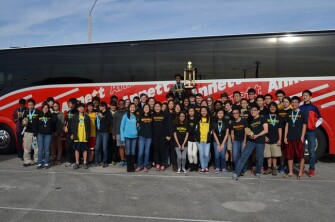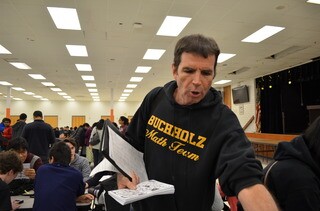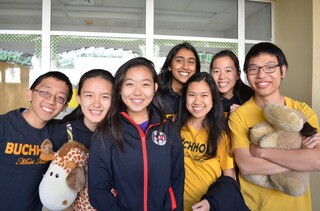
Most of the training for high-level math competitions happens outside of regular school hours, as I wrote recently.
But at least one teacher in Florida has found a way around that—and it’s paid off to the tune of nine national math championships.
Will Frazer, once a bond trader on Wall Street, began teaching advanced math to middle and high school students in Gainesville, Fla., in 1997. In his second year teaching, he got a flier in his mailbox about a math competition, and asked students from his Algebra II Honors class if they wanted to go. They did. “We got destroyed,” he said in an interview. “On the bus ride home, kids asked me how to solve some of the problems, and I couldn’t do it.”
He and his students began practicing after school. “I quickly figured out that the system everybody had was a really flawed system,” he said in an interview. “The public school system doesn’t do anything to help with the high-end competitive stuff. ... You bore the kids for 50 minutes every day and then they come after-school every week to try to learn the competition stuff.”
Several years later, he proposed an idea to his principal: What if he took the top few kids in his honors classes and taught them competitive math during the school day? His principal said yes, and his in-school competitive track was born. He now teaches Algebra I competition, Algebra II competition, and geometry competition courses.
“We go very fast, and test very hard,” he said. “I teach kids how to approach problems, how to think about problems that aren’t the typical rote thing you do in an honors class. In honors, you repeat things 20 times and then give a test that’s an exact clone of what you’ve been doing, and they’re not really having to think. When you compete, you don’t know exactly what the problem is going to

look like or how it’s going to turn out.”
His students now enter 30 or 40 competitions every year. “Some are really small, like a 30-minute mail-in thing that you take once a
month at school,” he said. “Some are more elaborate—you get on a bus and go to a town to compete all day.” Those often take place on the weekends or during the summer. The middle school competitions tend to be fast-action, like MathCounts, while the high school competitions give students several hours to answer just a few questions.
Frazer’s students have now won 12 state and nine national Mu Alpha Theta math team championships.
Cheap Math Camp
To help students prepare for the Mu Alpha Theta competition, Frazer runs a series of math camps for 5th through 9th graders at Buchholz High School over the summer.
It’s a low-cost operation, he emphasizes. “We can put 150 kids on my floor. All I need is two adults who we’re paying $20 an hour to monitor for discipline and safety,” he said. His high school students develop the lessons and lead the camps, which last four hours each weekday for four weeks.
“These kids are coming to 80 hours of math camp,” he said. “Think about 80 hours. In a typical semester, you’re coming for 72 hours. They’re getting more than a semester in. We’re light years ahead of anybody we’re competing against.”
Seeking Diversity
The Alachua County school district, where Frazer teaches, covers the area where the University of Florida flagship campus is located.
Like most competitive math communities, the kids on Frazer’s team aren’t a very diverse group. The majority are Asian, and many

have parents who work at the university. They certainly don’t match up with the full district’s population, which is about 4 percent Asian, 30 percent African American, and 45 percent white.
“In American culture, we talk about sports and things like that,” he said. “I have to make a better effort if I’m going to get non-Asian kids on the team. The culture is not ingrained.”
With the support of his district administrators, Frazer is working to get a wider group of kids, including more African-American students, involved.
“The key is you’ve got to get the kids earlier,” he said. “You can’t find kids in 8th grade and develop them to get to math competitions in high school—it’s too late in the game.”
The district has started an elementary school math league, in which all students take several competition-like tests. This has helped Frazer identify students from a variety of schools, including in lower-income areas, who might otherwise not have gotten involved in advanced math.
“I have a database of 1,500 kids,” said Frazer. “I target kids to invite to summer camps and competitive camps. If you can find them in 4th or 5th grade and say this kid is going to be really great by high school, we have a chance to turn them into competitors.”
Images: Courtesy of the Buccholz Math Team
Related stories:
